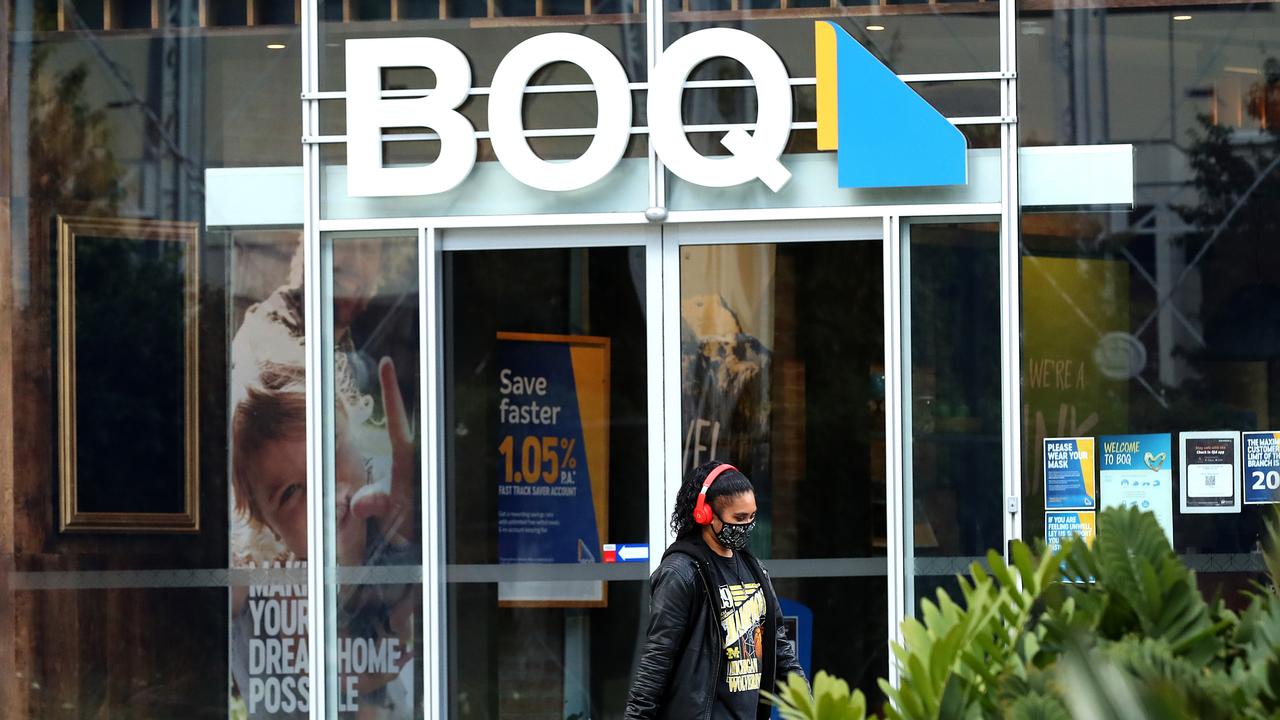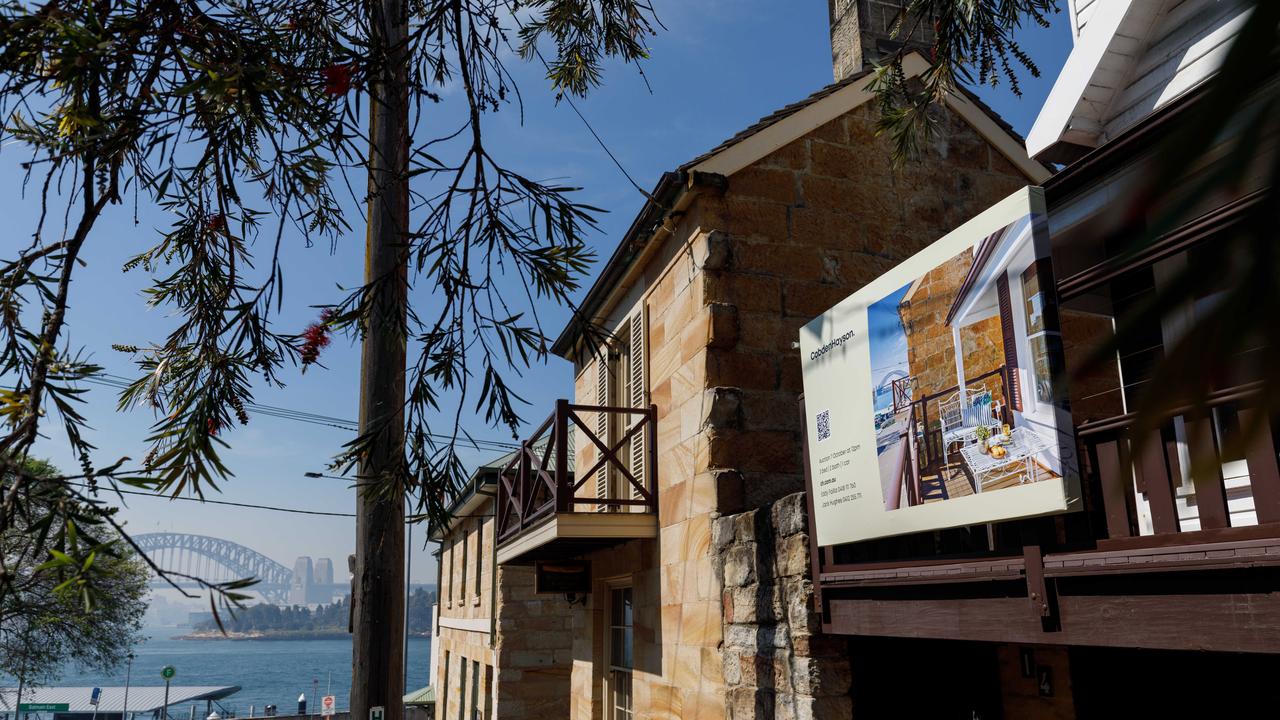Bank of Queensland half-year earnings down 98pc on $260m in impairments and provisions
The bank’s interim earnings have fallen 98 per cent on the back of impairment charges and provisions for its risk and compliance programs.

Business
Don't miss out on the headlines from Business. Followed categories will be added to My News.
Bank of Queensland on Friday revealed a big cost provision to fix compliance issues after regulators demanded improvements to its risk systems, and said a big impairment charge to align its valuation with its depressed share price will almost wipe out its statutory profit.
A $200 million non-cash impairment charge to goodwill and a $60m cost provision to fix its risk management systems will push unaudited statutory earnings for the first half of 2023 to $4m when it reports its interim results on Thursday. That would be down 98 per cent from the previous year.
The bank, which also flagged cash earnings would be below analysts forecasts without providing details about the composition of operating profits, said it would cut its interim dividend to 20c per share, from 22c for the same period a year ago.
Bank of Queensland shares fell as much as 3.85 per cent to $6.24 in early trade, before partially recovering to close at $6.43.
The $60m provision, or $42m after tax, will be taken for the cost of a three-year “Integrated Risk Program” following reviews that identified that “a material uplift is required” in respect of BOQ’s operational resilience, risk culture and Anti-Money Laundering and Counter-Terrorism Financing Act program and compliance.
BOQ said it was “engaging proactively with regulators in relation to the scope and governance of the Integrated Risk Program, with external subject matter experts engaged to assist”.
The goodwill impairment was somehow expected by analysts given BOQ has replaced its CEO and shares have lost about a third of their value in the past 18 months, but the non-cash cost provision could be ominous, analysts said.
Goldman Sachs analysts told clients that “the issues of focus (particular AML/CTF) in today’s announced IRP have been prevalent to those we have seen in major bank peers (CBA and WBC) which have consequently resulted in regulatory action from AUSTRAC; as such we view this as a tail risk for BOQ”.
The statement did not mention any regulator by name but in an analyst call, managing director and chief executive officer Patrick Allaway was forced to reassure analysts BOQ was not under investigation from AUSTRAC and did not have an enforceable undertaking with the regulator.
“If we did, we would have a disclosure requirement,” Allaway said in the call.
“This is really about a continuous improvement in our compliance with our AML CTF program, and we recognise that we have more work to do.”
“We are investing in systems and processes to ensure compliance, and we also are investing in uplifting our organisational culture to ensure that we identify, isolate and manage current and emergent risk.”
Spokespeople for AUSTRAC and the Australian Prudential Regulation Authority, declined to comment.
Last July, BOQ was fined by the Australian Competition and Consumer Commission for noncompliance with the Consumer Data Right through its Open Banking services.
A spokesman for the regulator declined to comment on BOQs compliance matters specifically, on Friday.
He added, however, that the ACCC has “not endorsed proposals on the rectification schedule as satisfactory resolution of noncompliance and may still take compliance or enforcement action where appropriate”.
Such schedule lists several banks, including BOQ and their self-reported “potential implementation gaps” in complying with consumer data rights rules, as well as their proposed resolution dates.
Four months after the ACCC penalised BOQ, the bank’s former chief executive, George Frazis, departed in what the company said reflected a recalibration of its lending growth and risk management settings as the economy slowed.
Allaway became executive chairman at the time of Frazis’ departure in November, and last month was formally appointed as CEO until the end of 2024 to provide stability to the bank.
“They’ve had a few years of underinvestment in risk management and operational resilience and they’re now making up for that,” Azib Khan, director of banks research at Evans and Partners said.
“The problem here is we really can’t be sure if more investment is needed because they don’t have a long-term CEO in place at the moment. The real question is when a new CEO is appointed on a more permanent basis, to what extent will there be a clearing of the decks?”
Excluding the non-cash impairment and provision, unaudited cash earnings for the first half, a keenly watched metric, came in at $256m. That is lower than the $265m consensus forecast and down 4.6 per cent from the previous corresponding half, when BOQ had reported a statutory net profit after tax of $212m and cash earnings of $268m.
“Although the cost provision and the goodwill impairment are being treated as non-cash items, their cash earnings have missed my forecast by 5 per cent and missed consensus.
“They are not giving any details on the composition, but I think margin weakness is at least partly to blame, as well as cash expenses above the line being higher.”
Originally published as Bank of Queensland half-year earnings down 98pc on $260m in impairments and provisions






